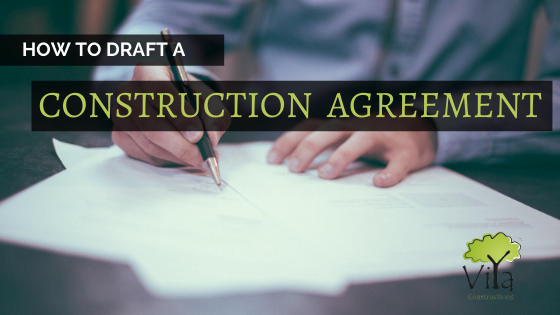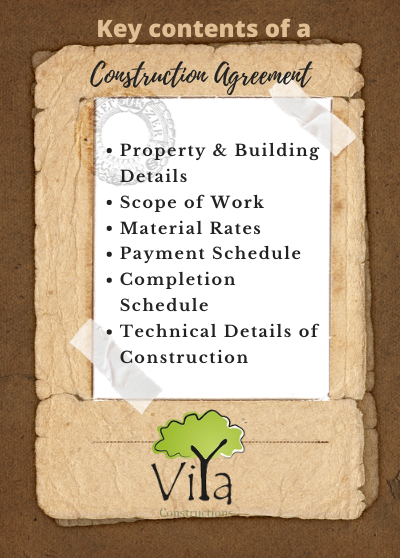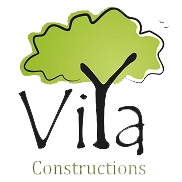Why is it important to have a construction agreement?
So, after several days and months of thought and discussion, you have taken that decision – the decision to build a house of your own. You know what tiles to use in your living room, which direction your bedroom windows should open to and where to have your morning cup of tea. You have already started dreaming of your Grihapravesam day and have made plans of how the interiors of your rooms should be. And the last thing you want is a tussle with your civil contractor over construction terms and conditions. As the saying goes, it’s always better to be safe than sorry; especially in a situation where your money and dreams are at stake. Let’s look into more detail at a construction agreement or a construction contract.
The objective of a construction agreement is to have the terms and conditions of the construction process clear. It is a legally binding document that ensures that the construction process is smooth and there is no room for any ambiguity or dispute from either party.

Parties to an agreement
Usually there are two parties in a construction agreement. They are the
-
The construction company or the construction contractor performing the work
This section will clearly state the details of the company/contractor including their name, address & PAN number. It is customary for the construction company to appoint a representative to sign the contract on its behalf. In such cases the name, address and Aadhar/PAN number of the company representative should also be included in the agreement.
-
The owner or representative of the person building the house
The person’s name, address and identification number like Aadhar or PAN number should be included in the agreement.
The agreement has to be made on a stamp paper of value Rs 200/-
Contents of an agreement
Let us now look at the other major contents of a construction agreement. What we have listed down are the most important and must haves contents of an agreement. However, as required, new clauses may be included.
Property & Building Details
- Details of the building under construction – size, location. This section includes the details of the property where the building is to be constructed. Some of the details are the location of the property, size of the property, Registration details, Size of the building in Square feet or Square metres and purpose of the building.
Scope of work
-
- Inclusions or Scope of work – The scope of work by the contractor should be clearly defined and mentioned in the construction contract. For instance in some cases you would want the contractor to do a full turnkey construction of your house, whereas in other cases you would just need the civil structure or finishing works or a combination. In any case make sure you clearly define the scope before the start of the project.
- Specific exclusions – As in the case of inclusions, specific exclusions should also be clearly noted. For example, if you want a different party to construct the compound work or the well work, make sure that you exclude that from the scope of work of the main contractor

Materials – Specifications & Rates
- Materials Used – It is always advisable to have a fair idea about the type of materials that you would need to construct your house. Certain materials like cement and electrical wires would be the standard ones considering safety and quality considerations. However certain other materials like tiles, paints, fittings etc can be chosen as per the customer’s preference. Defining the materials upfront will also help in determining the approximate cost of construction. Decisions like whether you would use Teak wood or Anjili for the front door and Standard, Premium or Luxury fittings for your toilets etc would go a long way in cost optimization.
Payment Schedule
- Payment schedule including taxes – In the contract, the actual construction contract amount would be clearly mentioned. This would be the cost of building the items mentioned in the scope. Provide a split-up of the total cost as Appendix.
Payments to the contractor are usually done in stages. You should define the payment schedule and state it in the contract.
Completion Schedule
- Completion schedule – Usually construction contractors agree to complete a building in 10-14 months. However this timeline varies depending upon the size of your building and other external factors. Once you agree upon the overall construction timeline, your contractor should be able to work out a stage-wise completion schedule. Make sure you add this completion schedule to the construction agreement. This is all the more important as the payment schedule is linked to overall completion schedule.
- Force Majeure – Under certain unforeseen conditions, that are beyond the control of either party, the construction may get delayed. In such cases it might not be possible to complete the construction within the stipulated time. There should be a clause in the construction contract to cover such unanticipated delays. This is known as Force Majeure and may include circumstances like Covid attack, floods, earthquakes and the like.
Technical Contents of a Construction Contract
Floor Plan and Elevation
The detailed and finalized floor plans should be part of the construction contract. It is a good practice to add the elevation drawing also to the floor plans.
Detailed Scope of Work
Before you sign the construction contract, you should have a clear idea of what you expect when the house is complete. This should include all minor and major details and these should be explicitly jotted down in the agreement. Let’s look at it section by section.
Land development
Before you start the construction, you will have to make the plot ready for construction. This could include earth excavation, land filling if required, compound wall construction, digging of wells etc. Each of these should find its place in the agreement as a line item. Make sure you include as much detail as possible. For example, in the case of a compound wall, mention the height, type of brick to be used etc. Similarly you can choose to do earth filling with crushed demolished building materials and crusher byproducts or with red soil, which would obviously be costlier. Make the decision upfront and add it to your contract.
Foundation
The foundation required for your house depends on a variety of factors like the soil condition and size of the house. After examination of your plot, the structural engineer would recommend an appropriate foundation type for your house. Include this detail in the construction agreement.
Blockwork
The strength and life of your building depends on the materials that you choose for construction. An important and crucial decision that helps you in achieving a long lasting building is the type or bricks that you use. Different types of bricks are available in the market and each has its own unique characteristics. Choose the one that you feel suits your preferences and budget.
RCC Work
RCC is the Reinforcement of Steel to Concrete to make it stronger. You can read more about RCC here.
RCC is required in roof slabs, staircases, lintel, parapet walls and kitchen slabs. The Indian Standards code have certain guidelines on the mix ratio of cement, sand and coarse aggregates for optimum reinforcement. The ratio varies depending upon conditions like the site of construction, strength of building required, cost considerations etc. Taking all these factors into considerations, you should discuss with your structural engineer and come up with the optimum mix ratio and thickness of your RCC and add it to your contract.
PCC Flooring
PCC or Plain Cement Concrete is used before tiling. It acts a base for setting the tiles and uses a mixture of cement, sand and aggregates. Unlike RCC, PCC does not play any major role in strengthening the building. However you should decide on the mix ratios and add it to your agreement.
Railing work
Discuss and decide on the railing work required in your house. You would need it for your balcony and staircase.
Tanks
There are different types of tanks that you need to install in your house for different purposes. They are the water tank, soak pit, septic tank etc to name a few. The capacity, dimensions and materials used for each varies.
Interiors
Before you sign the contract, discuss with your construction contractor about the interiors of your house. You can include basic interior works like modular kitchen, Television unit for the living room, crockery shelf for the dining/kitchen areas in your contract.
Want a Sample Copy of a Construction Agreement?
Please provide your details below
Electricals
Identify all the electric points in the house. You should consider the livability considerations of all the spaces in your house. We would recommend that you do the Trace test to evaluate your floor plan, before coming up with the electrical points. You can access the test here.
Once you create your activity list as per the plan, it will be easier for you to come up with the electrical points and add this to your construction contract. Also make a list of your preferred electrical fittings and include it in the construction agreement.
Painting
The colours and type of paints you choose depends on your individual preferences. However there are a few basic parameters that you need to watch out for. First of all, you should have a clear idea of the number of colours you need in your house. You would prefer your living room wall to be of a bright yellow shade, whereas your little princess would want a pink painted wall. Think of all these criteria and come up with the total number of colours you need. This will help the contractor decide on the quantity of paint required in each colour and thereby the cost of paint.
Another point to note is the usage of primer. Primer acts as an adhesive between your walls and the emulsion (i.e the actual water based paint). For Kerala conditions, make sure you opt for a coat of primer and at least 2 coats of emulsion. This would ensure that your painted walls last long.
Make sure that you include the types of paint and the number of coats of each in your construction contract.
Carpentry
The coveted front door, other external doors, internal doors, bathroom doors and windows fall under this category. You can choose the preferred materials and thickness for the doors and window panes. The sizes of the windows frames and window grills should also be documented in your construction agreement.
Plumbing
The length and type of plumbing and sewage lines, plumbing fittings etc fall under this section. Plumbing and sanitary fittings are a category of building materials that are available over a wide range of prices. For example, bathroom taps are available from Rs 100/- to Rs 20,000/- Have a look at a few products within the price range and fix your budget for your sanitary fittings.
Flooring
There are several flooring options that you could choose from, when building a house. Some of them are tiles, granite, marble or oxide flooring.
There are different types of tiling required for a house. This includes the fancy floor tiles used in your living room, the anti slippery tiles for bathrooms and the kitchen tiles that come with extra grip. In addition to these, there are Dado tiles used for bathroom and kitchen walls and skirting tiles.
You would also need granite worktops for your kitchen slab and work area. Fix your budget for your tile work and add them to the construction contract.


